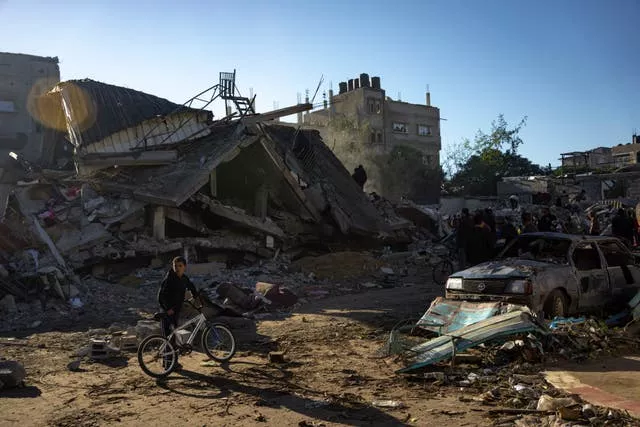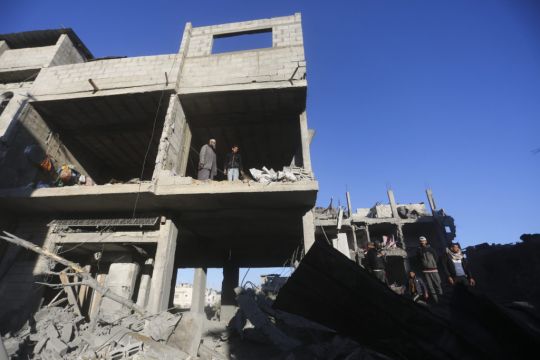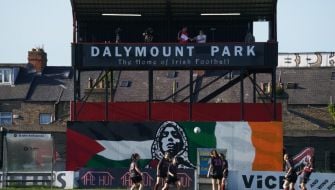The US and Israel have discussed a timetable for scaling back intense combat operations in the war against Hamas, even though they agree the overall fight will take months, an envoy has said.
It comes amid growing American unease about the mounting death toll in Gaza.
US national security adviser Jake Sullivan also met Palestinian President Mahmoud Abbas to discuss the besieged enclave’s postwar future, which, according to a senior US official, could include bringing back Palestinian security forces driven from their jobs in Gaza by Hamas in its 2007 takeover.
American and Israeli officials have been vague in public about how Gaza will be run if Israel achieves its goal of ending Hamas control — and the idea, floated as one of several, appeared to be the first time Washington offered some detail on its vision for security arrangements in the enclave.

Any role for Palestinian security forces in Gaza is bound to elicit strong opposition from Israel, which seeks to maintain an open-ended security presence there and says it will not allow a post-war foothold for the Abbas-led Palestinian Authority, which administers parts of the Israeli-occupied West Bank but is deeply unpopular with Palestinians.
In meetings with Israeli leaders on Thursday and Friday, Mr Sullivan discussed a timetable for winding down the intense combat phase of the war.
Israeli defence minister Yoav Gallant told Mr Sullivan it would take months to destroy Hamas but did not say whether his estimate referred to the current phase of heavy airstrikes and ground battles.
Mr Sullivan said on Friday “there is no contradiction between saying the fight is going to take months and also saying that different phases will take place at different times over those months, including the transition from the high-intensity operations to more targeted operations”.
He said he discussed a timeline with Prime Minister Benjamin Netanyahu and Israel’s war cabinet, and that such conversations would continue during an upcoming visit by US defence secretary Lloyd Austin.
The offensive, triggered by the unprecedented October 7 Hamas attack on Israel, has flattened much of northern Gaza and driven 80% of Gaza’s population of 2.3 million from their homes.
Displaced people have squeezed into shelters mainly in the south in a spiralling humanitarian crisis.

US President Joe Biden’s administration has expressed unease over Israel’s failure to reduce civilian casualties and its plans for the future of Gaza, but the White House continues to offer wholehearted support for Israel with weapons shipments and diplomatic backing.
“I want them to be focused on how to save civilian lives,” Mr Biden said on Thursday when asked if he wants Israel to scale down its operations by the end of the month.
“Not stop going after Hamas, but be more careful.”
A deadly Hamas ambush on Israeli troops in Gaza City this week showed the group’s resilience and called into question whether Israel can defeat it without wiping out the entire territory.
Israel’s air and ground assault over the past 10 weeks has killed more than 18,700 Palestinians, according to the Health Ministry in Hamas-run Gaza.
Thousands more are missing and feared dead beneath the rubble.
The ministry does not differentiate between civilian and combatant deaths.

Its latest count did not specify how many were women and children, though they have consistently made up around two-thirds of the dead in previous tallies.
On Friday morning, communications services, which telecommunications provider Paltel said on Thursday were cut due to ongoing fighting, still appeared to be down across Gaza.
Israeli airstrikes and tank shelling continued overnight and into Friday, including in the southern city of Rafah, part of the shrinking areas of tiny, densely populated Gaza to which Palestinian civilians had been told by Israel to evacuate.
At least one person was killed, according to an Associated Press (AP) journalist who saw the body arriving at a local hospital.
The Qatar-based television network Al Jazeera said its chief correspondent in Gaza, Wael Dahdouh, was wounded in his right arm by shrapnel in a drone strike at a school-turned-shelter in the southern city of Khan Younis.
The network said Gaza cameraman Samer Abu Daqqa was also injured.
In October, Mr Dahdouh’s wife, son, daughter and a grandson were killed in an Israeli airstrike.
The news came as a rare rocket barrage directed at central Israel sent air raid sirens blaring across Jerusalem.
Israel’s rescue service said it had received reports of a hit Friday, but said there were no immediate casualties.
It was not immediately clear how many rockets had been fired, but an Associated Press reporter heard numerous launches of Israel’s Iron Dome missile defence system.
Israeli media reported that it was the first time in a month and a half that sirens rang in Jerusalem. Since the war began on October 7, rocket barrages have been far more common in the coastal city of Tel Aviv and areas bordering the Gaza Strip.

Israelis remain strongly supportive of the war and see it as necessary to prevent a repeat of October 7, when Palestinian militants attacked communities across southern Israel, killing around 1,200 people, mostly civilians, and taking some 240 hostage.
A total of 116 soldiers have been killed in the ground offensive, which began on October 27.
The Israeli military on Friday confirmed the recovery of the bodies of three hostages.
Two were soldiers, both 19, and the third was a 28-year-old dual French-Israeli national kidnapped from a music festival.
More than 100 hostages have been freed, most during a ceasefire last month in exchange for the release of 240 Palestinian prisoners held by Israel.
Mr Sullivan met Friday with Mr Abbas, who lost control of Gaza when Hamas drove out his security forces in 2007.
The takeover came a year after Hamas defeated Mr Abbas’ Fatah party in parliament elections and the rivals failed to form a unity government.
A senior US official said Mr Sullivan and others have discussed the prospect of having those associated with the Palestinian Authority security forces before the Hamas takeover serve as the “nucleus” of postwar peacekeeping in Gaza.

It was one idea of many being considered for establishing security in Gaza, said the official, who spoke on condition of anonymity in line with White House ground rules.
He said such talks were taking place with Israel, the Palestinian Authority and regional partners.
The US has said it eventually wants to see the West Bank and Gaza under a unified Palestinian government, as a precursor to a Palestinian state — an idea soundly rejected by Mr Netanyahu, who leads a right-wing government opposed to Palestinian statehood.
Palestinian officials have said they will only consider a post-war role in Gaza in the context of concrete US-backed steps towards Palestinian statehood.
The Palestinian prime minister told the AP it is time for the US to deal more firmly with Israel, particularly on Washington’s calls for negotiations for a two-state solution to the Israeli-Palestinian conflict.
“Now that the United States has talked the talk, we want Washington to walk the walk,” Mohammed Shtayyeh said on Thursday.
“If the United States cannot deliver Israel, who can?”
As part of post-war scenarios, Washington has also called for revitalising the Palestinian Authority, without letting on whether such reforms would require personnel changes or general elections, which last took place 17 years ago.
The 88-year-old Mr Abbas is deeply unpopular, with a poll published on Wednesday indicating close to 90% of Palestinians want him to resign.
Meanwhile, Palestinian support for Hamas has tripled in the West Bank, with a small uptick in Gaza, according to the poll.
Still, a majority of Palestinians do not back Hamas, according to the survey.







